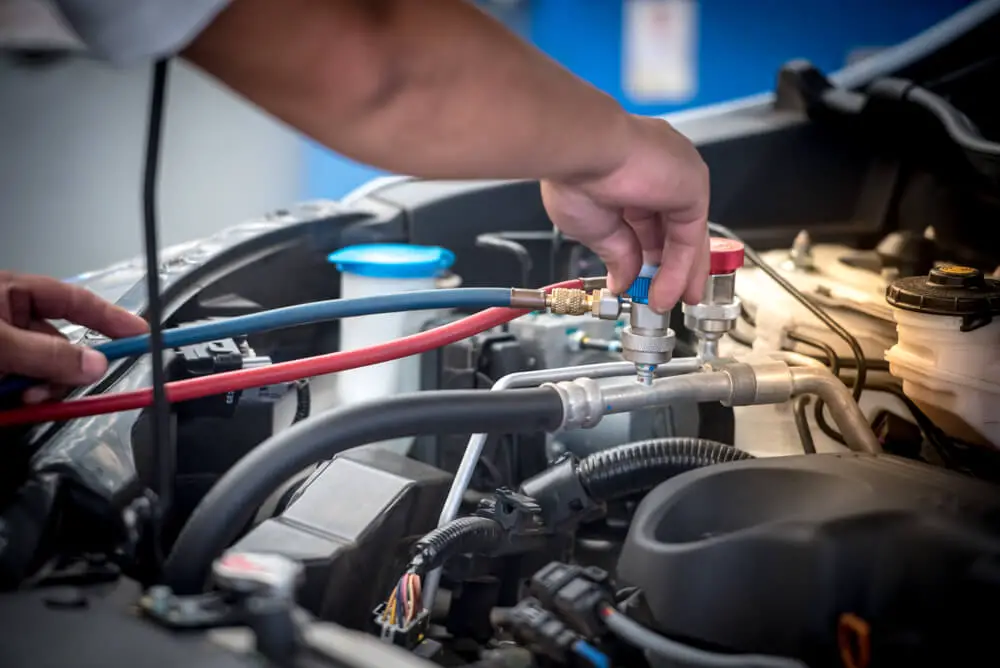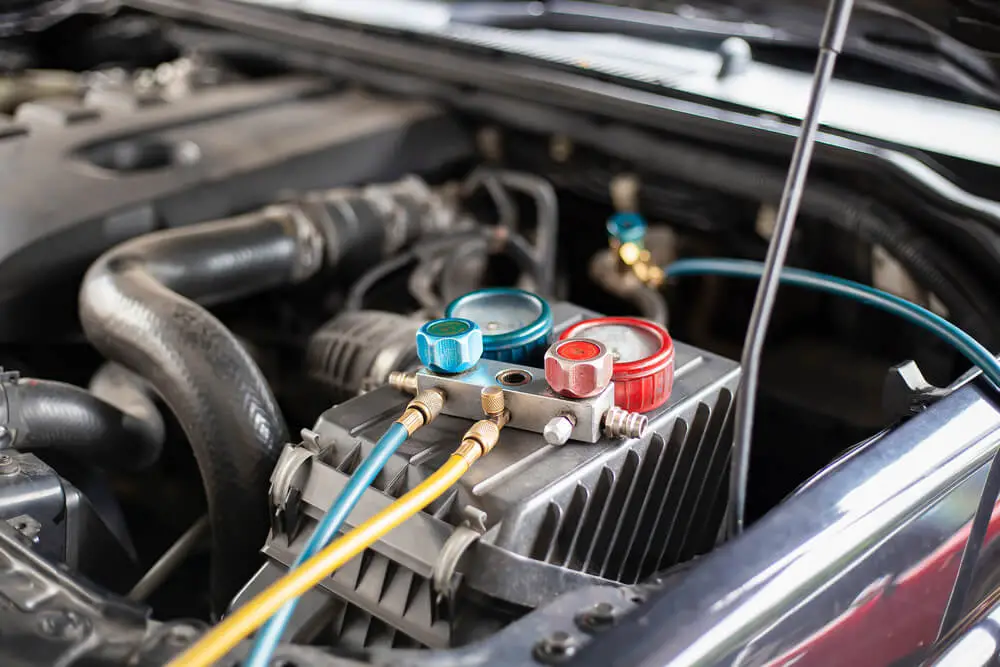Freon leakage is the main cause of poor AC cooling in a car. However, ascertaining where and when the freon escapes from the air conditioning system is a more critical issue when finding a solution to the problem.
It is already established that refrigerant leaks usually occur when the AC is on. Nevertheless, there are contemplations about whether the same happens when a car’s AC is off.
So, if you’re facing, “freon leaks when AC is off” this article perfectly dissolves your contemplations. Take some time to digest the following sections below.

Freon Leaks When AC is Off
Freon leaks don’t only occur when a car’s AC is on. A leaking AC unit can also cause freon to escape even when the system is off. However, the location of the leaks will most likely be around a unit with a failed seal.
Usually, a bad AC condenser, punctured lines, broken gasket, or seal are major causes of freon leaks in a car’s air conditioning system. However, the effects of some of these faults can be very obvious when the AC is on.
Freon leaks that occur when the AC is off are likely subtle leaks that may not be easily spotted. Since the refrigerant does not circulate when the AC is off, a slight leak around the evaporator coil may just be the reason for refrigerant leaks.
Symptoms of Freon Leaking
Like most vehicle malfunctions, refrigerants leaking from the AC system comes with a couple of symptoms you must look out for in a car. Some freon leak symptoms in a car air conditioning system include the following.
Poor AC cooling
The inability of a car’s AC to release cold air for cooling is one of the main symptoms that reveal a leaking freon. The refrigerant is a significant part of the cooling operation; therefore, an alteration in the proper flow of the refrigerant will automatically hinder its function.
Although other issues can hinder a car’s AC from blowing cold air, a low freon level due to a constant leak is a primary culprit. Therefore, if you’re having a hard time with your AC blowing warm air, kindly contact an expert auto technician to check it out.
Hissing noise from indoor AC unit
The escape of freon gas is also characterized by a hissing noise from a leaking unit. Sometimes, the hissing noise can be accompanied by a liquid bubble sound with smell. This is due to the extent of the hope on the AC unit from which freon leaks.
If you constantly hear a hissing noise in your car when driving or when you halt, it is most likely a challenge traceable to refrigerant leaks. Once you suspect any leaks, ensure to diagnose the actual cause of the problem and fix it immediately.
Frozen evaporator coils
Usually, when a car’s HVAC system is suffering from freon leaks, the evaporator coils will suddenly start to freeze. This is due to the system’s inability to absorb warm air.
Once you notice excess condensation leading to freezing in your car’s evaporator coil, it is a sign that the system has refrigerant leaks.
Low freon level
A leaking refrigerant will usually run low to the point of insufficiency virtually all the time. When this happens, it can trigger one or more of the other symptoms outlined above. If you constantly have low freon levels, could there be a leak you’re unaware of somewhere?
If the above is your contemplation, consult an HVAC professional auto technician to diagnose and fix the problem ASAP.
Can Freon Leak in AC be Fixed?
Of course, a freon leak in a car’s air conditioning system can be fixed once the problem has been diagnosed and the actual cause identified. However, fixing this issue may require repairing or replacing faulty HVAC system components.
Therefore, if you have a clogged condenser, broken gasket or seal, etc., these components may require replacements when fixing the refrigerant leaks. Nevertheless, fixing this kind of issue does not cost a fortune. However, you can be sure of spending an average of $200 – $1,500.
FAQs
How long does it take for Freon to leak out?
Freon would leak out between 30 minutes to 6 hours, depending on a couple of factors in the air conditioning system. The size of the hole in the lines, the quantity of available refrigerant, and the component’s age, which determines how much wear and tear has occurred, are factors to consider.
It is crucial to be proactive whenever you suspect a leak in the air conditioning system. Ensure to diagnose early symptoms of freon leaks and fix the issues before they escalate.
Can AC be low on Freon without a leak?
Technically, freon does not burn up like fuel in the combustion process. Instead, it is recycled within the air conditioning system to release cold air in a car. However, the lines and other AC units are susceptible to wear and tear over time. This can cause freon to leak without any apparent trace.
So, a car’s AC cannot be low on refrigerant without a leak. However, some leaks can be very subtle and are not easily noticed until you subject the Air Conditioners to a thorough diagnosis.
Where do most Freon leaks occur?
Most freon leaks occur in the air conditioner’s evaporator coil. This part is subject to challenges like cracking, dirt build-up, freezing, etc. Meanwhile, a broken evaporator coil will eventually result in freon leaks.

However, other areas where freon leaks occur include the Schrader valve, copper lines, welded joints, copper tubing, “U” connectors, etc. Ensure to check these parts if you’re experiencing a leak.
How often do you need to add refrigerant to car?
A car’s air conditioning system would need refrigerant refill within 1 – 2 years. However, some vehicles may not require a refill for up to 5 years. Nevertheless, the car owner’s AC usage style and maintenance culture go a long way in determining how long the refrigerant lasts.
In other words, most vehicle components can last longer than many people expect; the challenge is the car owner’s driving style and poor maintenance culture.
How much does it cost to fix Freon leak in car?
The estimated cost of fixing a freon leak in a car ranges between $200 and $1,500. However, the repair cost can be more, depending on the car’s make and model. In addition, the fault responsible for the refrigerant leaks is another significant factor that can impact the cost of fixing the problem.
Therefore, performing a proper diagnosis to ascertain the actual fault would be best before fixing a freon leak in a car’s air conditioning system.
What happens to refrigerant when AC is off?
When a car’s air conditioner is off, the coolest part of the refrigerant condenses, while the remaining amount stays as gas in the AC coils.
Although using the air conditioning system is a fantastic relief, sometimes the component has to be switched off for your safety and the safety of the AC. Turning off the AC for a while does not affect the refrigerant or other components.
Conclusion
Even though most freon leaks occur when the air conditioning system in a car is engaged, the problem is not restricted to when you’re using the AC. In other words, if you’re wondering, “Does freon leak when AC is off in car?” Of course, it is possible.
However, this leak most likely occurs around locations with a failed seal in a particular AC unit. Therefore, if you’re experiencing this challenge now, consult an expert auto technician to find out what is happening to the HVAC system and fix it immediately.
